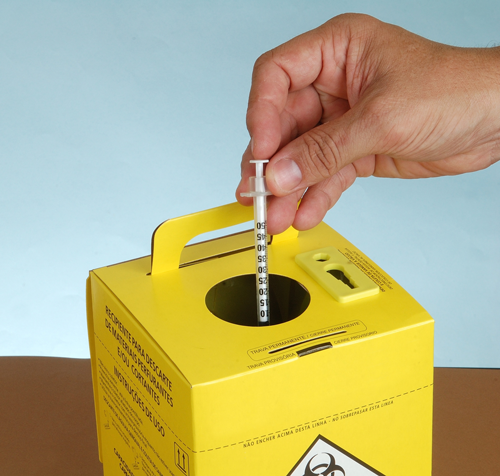Syringe Disposal & Syringe Exchange
Each year, approximately 9 million sharps users—or people who use needles, syringes, lancets, auto injectors, injection pens, infusion sets, or connection needles/sets to receive medication—will administer at least 3 billion injections outside of healthcare facilities. People use sharps to manage a wide variety of conditions, including allergies, arthritis, cancer, diabetes, hepatitis, HIV/AIDS, infertility, migraines, multiple sclerosis, osteoporosis, blood clotting disorders, psoriasis and more. Safely disposing of home-generated used sharps is important.
Many of these self-injectors are unaware of safe disposal methods available to them and discard used needles in the trash or flush them down the toilet, posing a risk of injury or potential infection from diseases such as hepatitis B or C and HIV.
Waste handlers are at the highest risk, but family members, small children, pets, and wildlife can be injured as well.
Proper storage and disposal of needles, syringes, and lancets will protect members of your household and the general public from accidental injury and help us have a safe, clean environment.

Syringe Exchange
“The Exchange”
Safer Disposal of Used Sharps
Safer Injection Supplies
Free Narcan Kits
Help with Accessing Treatment if Requested
-
SPH Training Center
4014 Lake Street, Suite 101
Homer - FIRST and THIRD TUESDAY of each month
- 5-7pm
- homerexchange@gmail.com
Disposal Options
Please use one of the safe disposal options detailed below.
Safe Trash Disposal
Place sharps in a hard plastic bottle with a screw-on lid, such as a bleach or laundry detergent bottle.
Do not use clear bottles. When bottle is ¾ full, screw the lid on, tape it down with duct tape, and write: “CONTAINS SHARPS – DO NOT RECYCLE.” Dispose with household trash, take to the local landfill.
Mail-Back Sharps Programs
Mail-back programs are an option for those who wish to purchase special sharps containers. Search the internet using keywords “sharps mail back.” All shipping materials, postage, and disposal fees are included in the purchase. Place your sharps in the special leak-proof containers and then mail to the company for disposal.
At-Home Needle Destruction Devices
Several manufactures offer products that allow you to destroy used needles at home. These devices sever, burn, or melt the needles
so you can put them in your trash. Check the internet for prices.
Resources
Center for Disease Control and Prevention (CDC)
South Peninsula Hospital Diabetes Education
U.S. Federal Drug Administration (FDA)
Do’s and Don’ts of Proper Trash Disposal
DO
-
Put sharps in a hard, solid-color (not clear) plastic container with secure lid. If you do not have a special sharps container, use a plastic bottle that cannot be broken or punctured. Close the screw-on cap tightly. When the bottle reaches ¾ full, put heavy duty duct tape around the lid and write “CONTAINS SHARPS - DO NOT RECYCLE” on the bottle.
-
Put sharps into your container as soon as you use them. Keep the container closed and away from children and pets.
- Bring appropriate container with you when you travel. States have different laws regarding sharps disposal.
DON'T
-
Don’t place uncontained sharps in the household trash.
- Don’t put sharps in soda cans, milk cartons, clear plastic bottles, glass bottles, or containers that can be broken or punctured. Coffee cans are not safe options because the plastic lids come off easily.
-
Don’t flush used sharps down the toilet or drop them in sewer drains.
-
Don’t put sharp containers in recycle bins.
-
Don’t try to break, bend, remove or recap needles, especially someone else’s.
- Don’t bring containers full of sharps to local clinics or pharmacies, or to the hospital outside of the designated times to receive sharps.